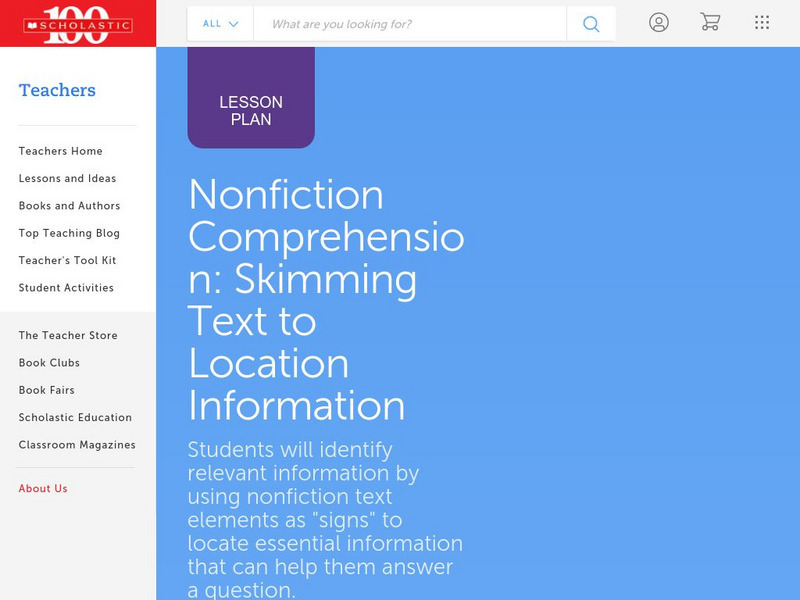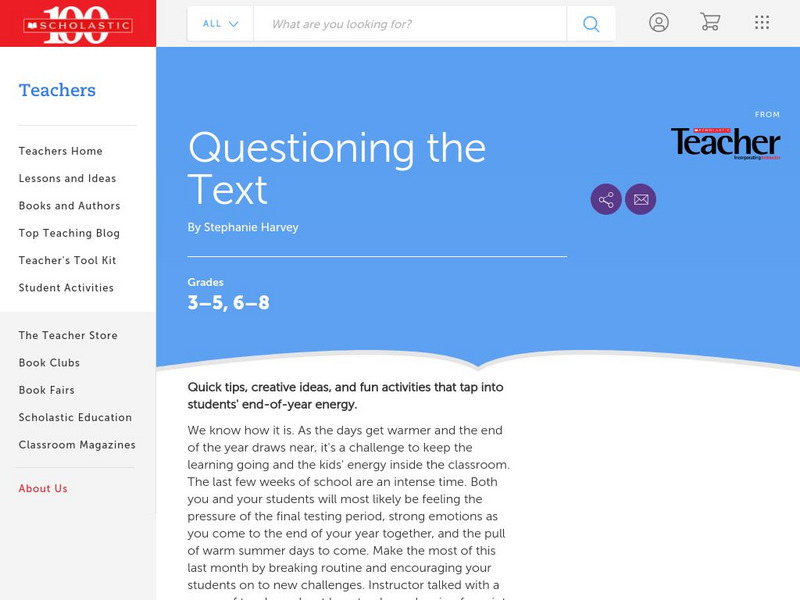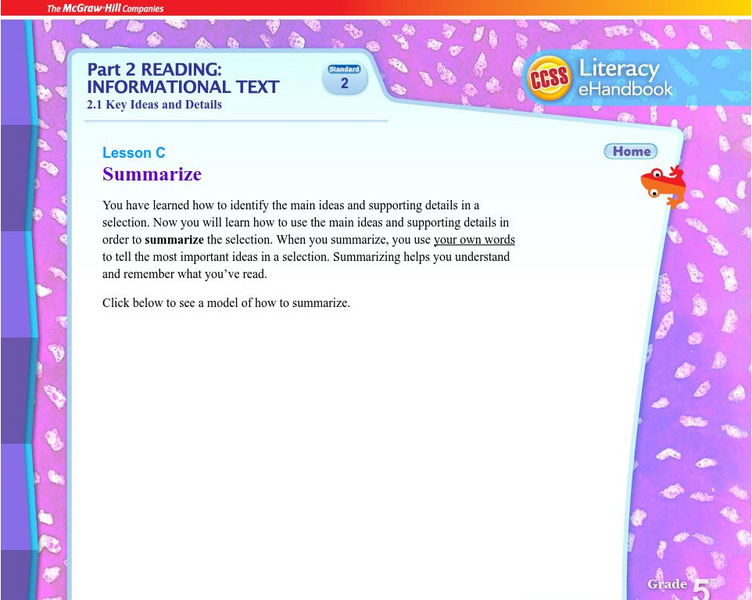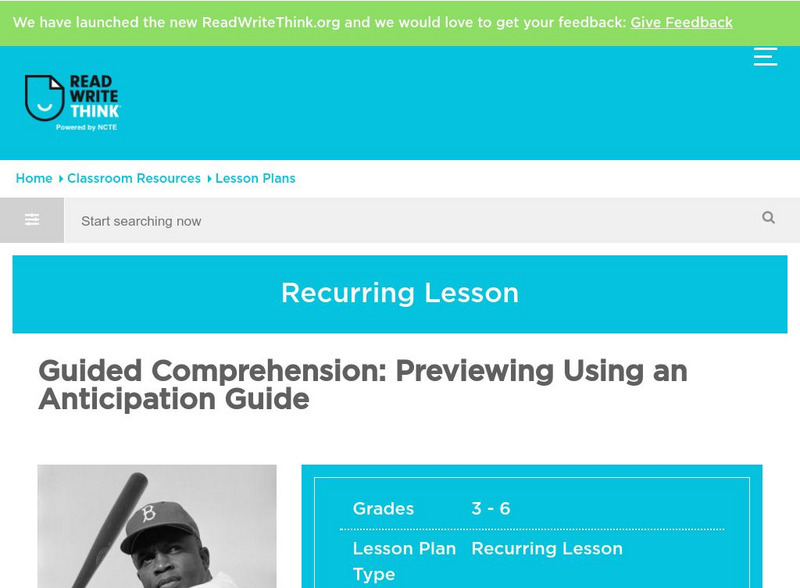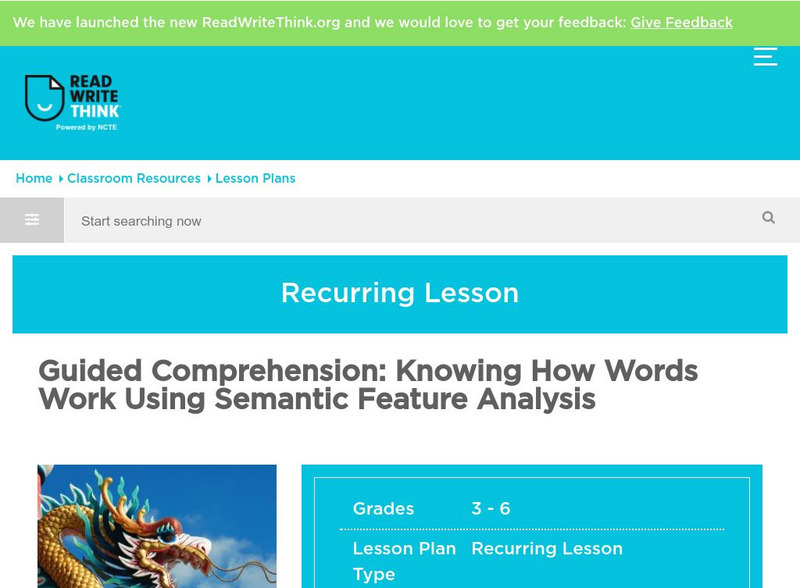Quia
Quia: Reading Comprehension (Reading for Facts)
There are 30 questions in this activity. Practice your reading skills with one or two short stories at a time. Read the story, then choose the answer that best answers the question.
Michigan State University
Michigan State University: Interventions for Reading: Reconciled Reading
This intervention, which is based on Schema Theory, engages young scholars in enrichment activities prior to reading the passage. In this way, students have the opportunity to activate and enhance existing knowledge before reading....
Scholastic
Scholastic: Lesson Plan for Nonfiction Comprehension: Skimming Text
Build comprehension by developing reading strategies for use with nonfiction text. This lesson focuses on teaching students to recognize text elements as clues to help them quickly locate key information in text.
Scholastic
Scholastic: Questioning the Text
In this magazine article originally featured in Instructor, the reading strategy called "questioning the text" is explained by the renowned literacy consultant and staff developer, Stephanie Harvey. The steps included for questioning the...
Beacon Learning Center
Beacon Learning Center: Web Lesson: Did I Read It: Implicit vs Explicit Details
Follow Carson through a lesson in order to become a better reader of informational text. Learn the difference between implicit and explicit information. Includes multiple interactive assessments and reading activities.
Curated OER
Mc Graw Hill: Part 2 Reading: Informational Text: Connections Within Text
Learn how information in a text can be connected through compare and contrast, cause and effect, and sequence.
Curated OER
Mc Graw Hill: Part 1: Reading Literature: Show Understanding of Text
This quick lesson from the Common Core Literacy eHandbook teaches students what questions to ask and how to answer questions to show your understanding of literature.
Curated OER
Mc Graw Hill: Part 2 Reading: Informational Text: Summarize
Learn how to summarize a text based on the main idea and supporting details you found.
Curated OER
Mc Graw Hill: Part 2 Reading: Informational Text: Understand Content Words
A reference page that shows you how to use context clues to figure out the meaning of unknown content words.
Curated OER
Mc Graw Hill: Part 2 Reading: Informational Text: Cause and Effect Text Structure
Cause and Effect is a text organization structure and knowing this structure can help you in comprehending a text. Learn about these strategies on this site.
Curated OER
Mc Graw Hill: Part 2 Reading: Informational Text: Summarize
Learn how to summarize a section of a text with this site.
Curated OER
Mc Graw Hill: Part 2 Reading: Informational Text: Understand Content Words
Understand how to use content words and context clues to identify unknown words in a reading passage.
Curated OER
Mc Graw Hill: Part 2 Reading: Informational Text: Evaluate Arguments and Claims
This article will help you evaluate informational text to determine whether an author's argument is supported by evidence or not. Click on Model to see a model with explanations and then click on Practice.
Curated OER
Mc Graw Hill: Part 2 Reading: Informational Text: Show Understanding of Text
This quick activity includes a passage from an information text, and explains reading comprehension strategies to use to answer questions.
Other
Interacting Texts Directed Activities Related to Texts (Darts)
Want to improve your students' reading skills? This is a good place to find the types of directed activities, using a definition text, reconstruction/analysis activities, and advantages of using DARTs.
ReadWriteThink
Read Write Think: Using Narrative for Expository Text
Lesson in which students read various narrative texts which provide a context for them to learn content-area topics. Narratives allow the students to begin to understand expository texts.
ReadWriteThink
Read Write Think: Guided Comprehension: Previewing
This lesson introduces students to the comprehension technique of previewing. Students use anticipation guides to preview and predict stories and work in small groups.
ReadWriteThink
Read Write Think: Guided Comprehension: Making Connections
Lesson introduces young scholars to the strategy of making connections. Students learn the three types of connections using a double-entry journal. A good resource for teachers.
ReadWriteThink
Read Write Think: Exploring How Section Headings Support Understanding
Teaching students to pay attention to headings and titles as they read? Here you'll find a practical application for using an expository text to apply the concept of using headings. Geared toward older elementary students, but lesson...
ReadWriteThink
Read Write Think: Guided Comprehension: Semantic Analysis
Lesson introduces learners to comprehension of knowing how words work. Students learn semantic feature analysis and examine folktales, myths, and fables using this analysis to better understand these terms and texts.
Curated OER
Mc Graw Hill: 4th Grade Use Details and Examples
This reference from the McGraw-Hill CCCS Literacy eHandbook discusses the importance of recalling explicit details. The importance of inferencing skills with a how-to graphic organizer for making inferences are included. Students may...
E Reading Worksheets
E Reading Worksheets: Context Clues Worksheets: Context Clues 2.2
This site shares a context clues worksheet. Students will read each sentence, write original definitions of bolded terms, and then write the clues that help them determine the bolded words' definitions. Links for an answer key,...
International Reading Association
Reading Online Articles: Comprehension Instruction
An article on improving reading comprehension through time-tested strategies as well as a summary of new hypotheses about effective comprehension instruction.
ReadWriteThink
Read Write Think: Guided Comprehension: Self Questioning
Online lesson introduces students to the concept of self-questioning, assisting them in an understanding of question-answer relationships that should improve their reading comprehension skills. In-depth study will lead to improved...




